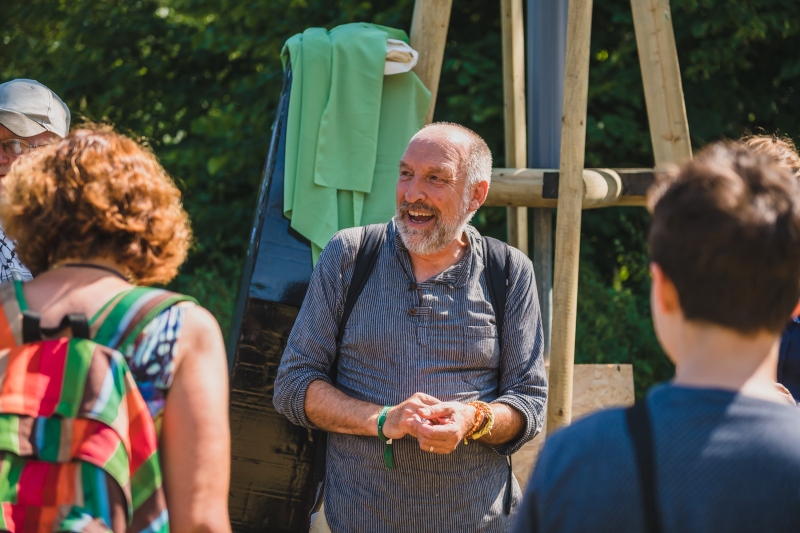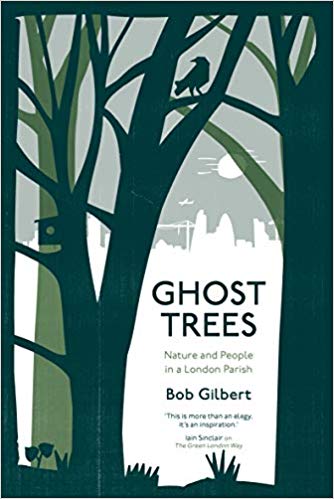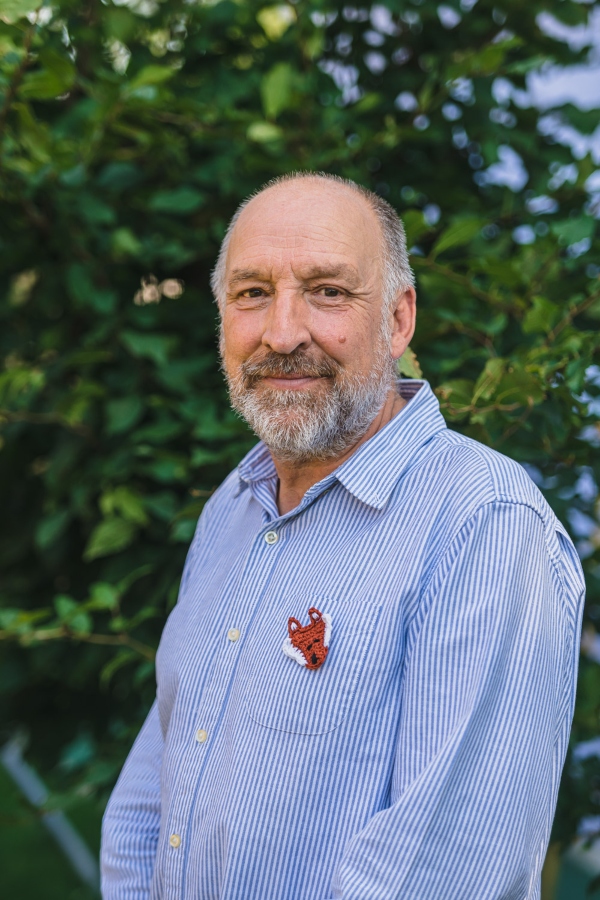'A pessimist with your head, an optimist with your heart'
Author, broadcaster and campaigner for conservation, Bob Gilbert's latest work Ghost Trees: Nature and People in a London Parish, was longlisted for the Wainwright Prize
He spoke to Alex Baker about what nature tells us about our places, the benefits of attentiveness in observing it, and his response to the climate crisis

We’d love to know a little bit more about Ghost Trees – how would you sum it up?
There are two central themes to Ghost Trees. One is that attentiveness is love. It’s about looking in detail at the world around you, where ever you happen to be. Even in an urban environment, it’s an awareness of the weed growing through the pavement or the moss growing on the wall. From that particular, you approach the universal.
 The other theme is the importance of place. I think we’re discovering more of that. I think capitalism took that away from us. There’s a movement to rediscover it. Place is your parish as an aperture and not as a perimeter. An aperture to use the local to see the general.
The other theme is the importance of place. I think we’re discovering more of that. I think capitalism took that away from us. There’s a movement to rediscover it. Place is your parish as an aperture and not as a perimeter. An aperture to use the local to see the general.
So I moved to Poplar with my wife. I’m a Quaker, she’s an Anglican priest. I’ve been looking in detail at the area where I live using those two themes. Anyone can do it! From exploring the area I can tell its story through the generation of trees that grow there. I start with the trees which were there before people arrived because even things which are gone leave their marks, their impressions. That’s why it’s called Ghost Trees. Attentiveness means seeing things that aren’t there, they leave their traces in other ways. So I move through all these generations of trees and look to what it would be like if humans suddenly disappeared – what would happen to nature?
But I also took 51 people from the parish and we walked with its boundaries, celebrating what’s there, before planting a black poplar in the church grounds – a tree that has been missing for 400 years.
What does nature tell us about our places?
What’s interesting in urban areas is that the plants, and to a lesser extent the animals, have arrived through such diverse routes. Most of them there are immigrants. Like most of the actual immigrant population. Without them we wouldn’t have the richness or diversity of life we have in urban areas. Some of the plants have come in accidentally – perhaps by the docks or along canal routes or spread along railway embankments. Some have escaped gardens or been brought in by human intervention.
Sometimes you can even work out the ethnic make up of an area by looking at its plant history. So in Poplar we have a plant called the Chinese Mugwort because we used to have a large Chinese population there. Now we have a large Bengali population and with that has come a plant called Brown Mustard growing on the streets because it’s used in Bengali cooking where it’s spread from their balconies and pots.
So a lot of what I do is trace the meaning of things sociologically – why did we plant that type of tree? How did that plant get there?
What are the benefits of attentiveness in observing nature?
Several. But first of all I regard it as a discipline. A spiritual discipline, a form of mindfulness. An awareness of our planet and its species with which we share this space. But more than that, when we are confronting some of the really big challenges we face in life, like climate change or species extinction, we cannot just be motivated by guilt or fear to drive the action. It has to come from a place of love. Attentiveness comes from love, a love of nature, from joy, from celebration. It springs from those positive places.
For me it’s been a big antidote to despair and depression. Which is a fairly logical response to the crisis we face.
With climate change in mind, how optimistic are you for the future? What in your view do we need to be doing?
 I think at root I’m probably not that optimistic. It depends on what you’re being optimistic about. In terms of the future of us, our species, I think it’s very much in the balance. This is the sixth great extinction. If you look at the history of the great extinctions it is always the dominant and the largest species which go to the wall.
I think at root I’m probably not that optimistic. It depends on what you’re being optimistic about. In terms of the future of us, our species, I think it’s very much in the balance. This is the sixth great extinction. If you look at the history of the great extinctions it is always the dominant and the largest species which go to the wall.
But on the other hand, nature will go on. So I am fearful for my children and their generation but nature itself will go on, with or without us. If you look at the history of extinctions, after that crash you get an amazing explosion of new species, new diversity and of nature going off in a whole new direction. So nature will go on with or without us – it just depends on how much we choose to be a part of that.
I have a duty, a spiritual duty, to continue with the struggle to save nature, whether I personally think we’re going to win it or not. You need to be a pessimist with your head and an optimist with your heart.
How would you like Christians to respond to the challenges of climate change?
Christians are usually late to get on the bandwagon, quite frankly. Now there are certainly a lot of Christians moving in and around the environmental movement but that’s only because the rest of society have started it off.
But I do think churches have a very important role because I think sometimes we get it wrong. I think we need a paradigm shift in the way we think. I think churches need to be pushing the spiritual message about our place in Creation and the importance of Creation. Rather than just chasing the tail like everyone else is doing and reducing your carbon footprint.
Two of the biggest enemies of environmentalism have been capitalism and consumerism. The real message that churches need to give is that there are values other than material values which govern life. Capitalism is so pervasive that we don’t even realise it’s an ideology. And the Church has a different ideology. Which we need to promote. There is an alternative to materialism.
Where does your love of nature come from – and how does your faith influence this?
I find this hard to answer because I was brought up in the inner city in Bermondsey. I just remember it growing slowly as a child. My mother was interested in plants but she could never remember their names. I can remember seeing my first blue tit. If you’ve brought up in a prefab in Bermondsey with just sparrows and then you suddenly see this little yellow and blue bird that looks so exotic, like it’s some a tropical country. I just remember that wonder.
My love of nature, and I’m a Quaker now, has actually helped to develop a perspective on faith which was different to my perspective as a child. Which stresses beauty and connectivity and celebration. I do love sitting on the mountains or in a forest but what I’m also about being alive to what is around you, where ever you are. Just being still and appreciating nature whether in an urban or unexpected setting.
More than 90 per cent of us in this country live in cities so in order to change people’s attitude to nature we need to start in the cities.
Bob Gilbert is the author of Ghost Trees: Nature and People in a London Parish (Saraband, 2018) and The Green London Way (Lawrence & Wishart, 2012).
He has written a column for Ham & High on urban wildlife for the last 20 years. A contributor to TV and radio, including Natural World and BBC Radio 4’s The Food Programme, Bob has also been a stand-up comedian, a long-standing campaigner for inner city conservation and chair of `The Garden Classroom’, a charity that promotes environmental education in London.
Ghost Trees was longlisted for the Wainwright Prize. This interview took place at Greenbelt 2019, where Bob was a speaker.
Alex Baker is a former sub-editor and movie reviewer of The Baptist Times who now works as a photographer
Images | Alex Baker Photography www.alexbakerphotography.com
Do you have a view? Share your thoughts via our letters' page.
Baptist Times, 29/01/2020